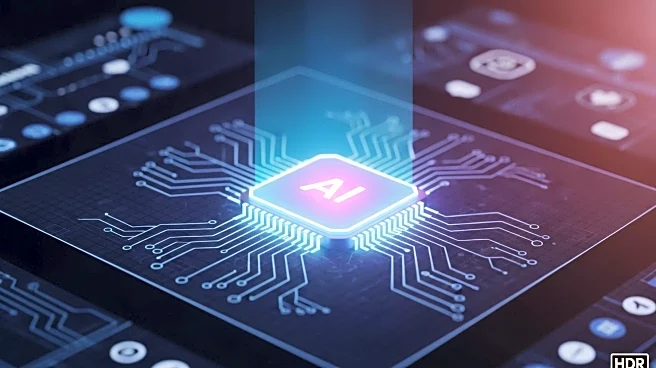What is the story about?
What's Happening?
Major technology companies are increasingly integrating artificial intelligence into social media platforms, aiming to transform user experiences. OpenAI's Sora app and Meta's AI tools are leading this shift, offering features like AI-generated videos and interactive personas. These developments are part of a competitive race among tech giants to capitalize on AI's potential, despite concerns over content authenticity and user safety. The Motion Picture Association has raised issues about copyright infringement due to AI-generated content, while OpenAI and Meta have implemented measures to address these concerns, such as metadata and invisible watermarks. Additionally, there are growing worries about the impact of AI chatbots on teenagers' mental health, prompting companies to enhance protections for young users.
Why It's Important?
The integration of AI into social media platforms represents a significant shift in how content is created and consumed, potentially altering the landscape of digital interaction. This move could redefine the business models of tech companies, as they explore monetization strategies for AI-driven content. However, the rapid adoption of AI raises ethical and legal questions, particularly regarding copyright and misinformation. The potential for AI-generated content to spread false information or infringe on intellectual property rights poses challenges for regulators and industry stakeholders. Moreover, the impact on young users' mental health highlights the need for robust safety measures, as AI tools become more prevalent in social media environments.
What's Next?
As AI continues to be integrated into social media, companies like OpenAI and Meta are likely to refine their technologies and policies to address ongoing concerns. This includes developing more sophisticated content moderation systems and exploring revenue-sharing models with rights holders. The industry may also see increased regulatory scrutiny as lawmakers and advocacy groups push for clearer guidelines on AI usage in digital platforms. Additionally, the evolution of AI-driven social media could lead to new opportunities for content creators and influencers, as platforms aim to attract the next generation of digital stars.
Beyond the Headlines
The rise of AI in social media could lead to broader cultural shifts, influencing how people interact online and perceive digital content. As AI-generated media becomes more lifelike, distinguishing between real and artificial content may become increasingly challenging, impacting trust in online information. This development also raises questions about the future of creativity and originality in digital spaces, as AI tools enable users to produce content with minimal effort. The ethical implications of AI's role in shaping social narratives and its potential to manipulate public opinion are areas that may require further exploration.
















